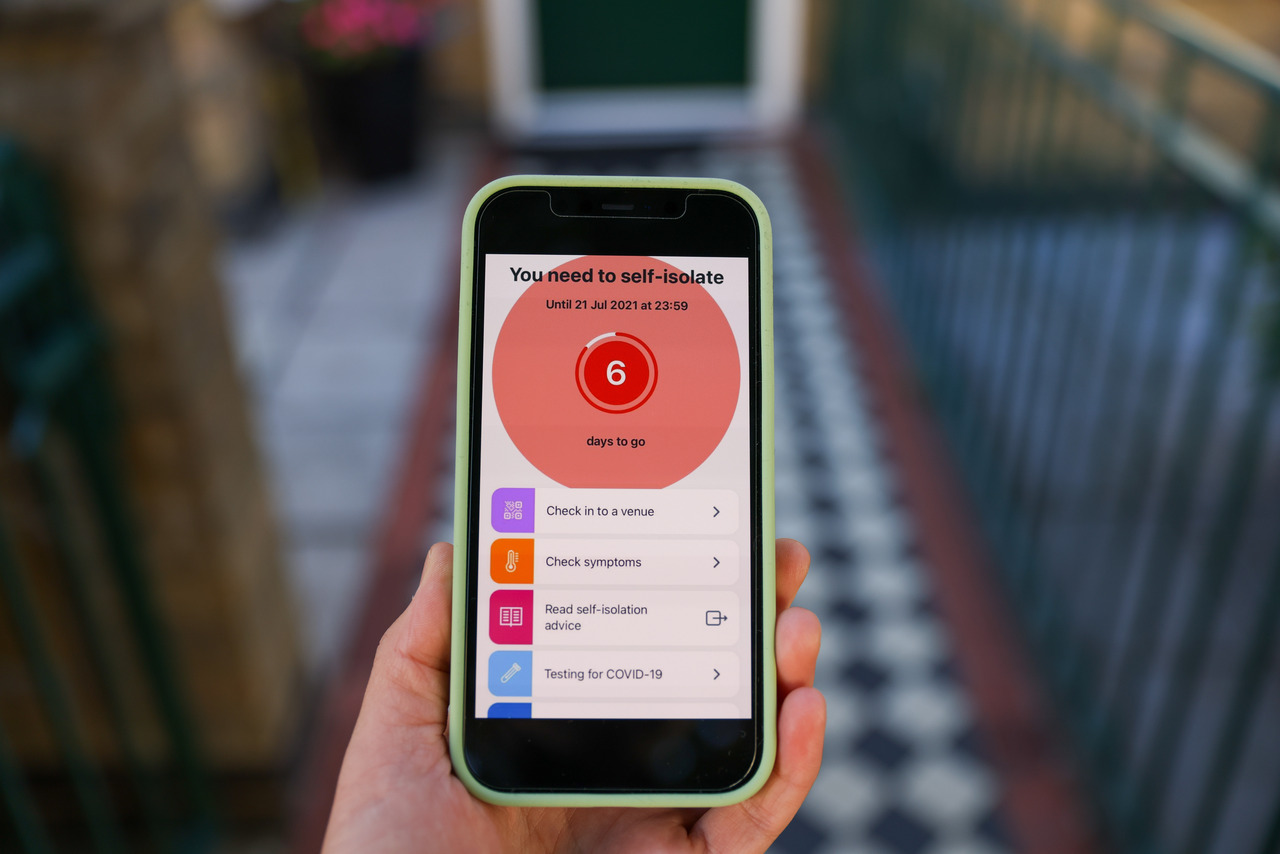UK businesses get hit by Covid-19 app forcing workers to isolate
Sign up now: Get ST's newsletters delivered to your inbox

National Health Service data show 520,194 people in England and 9,932 in Wales were contacted by the app in the week through July 7.
PHOTO: BLOOMBERG
Follow topic:
LONDON (BLOOMBERG) - UK companies are urging the government to speed up changes to self-isolation rules after hundreds of thousands of employees from across the economy were removed from the workplace because of a surge in alerts that they should stay at home.
Businesses from stores to car factories are reporting disruption after more than half a million people were contacted - or "pinged" - by the country's coronavirus app in a week.
Some retailers have suffered staff absences of up to 30 per cent, according to a person familiar with the situation.
Asos Plc Chief Executive Officer Nick Beighton said the online fashion business is feeling the squeeze at warehouses and its London headquarters.
As many as 900 workers at car-maker Nissan's plant in Sunderland are absent, and Rolls Royce has also been hit by a surge in "pings", the BBC reported on Thursday (July 15).
Up to 10 per cent of the workforce at some meat processors are affected with product ranges now being reduced.
The government is figuring out how to change the rules on self-isolation as Prime Minister Boris Johnson prepares to lift just about all coronavirus measures for England on July 19.
Ms Lucy Frazer, the solicitor-general, told Sky News on Friday that ministers are looking at the issue and recognise the "significant impact this is having on businesses".
"This will only get worse right across the economy, as cases are already rising fast and the final restrictions are eased," said Ms Helen Dickinson, the British Retail Consortium's CEO.
The government needs to bring forward the time when fully vaccinated people or those with a negative test no longer need to quarantine when "pinged" by the tracking system, she said.
A soaring infection rate has taken the gloss off the grand reopening, and now employers are complaining too many staff are being advised to isolate regardless of their vaccination status.
That's also exacerbating a labour shortfall in some areas such as hospitality and agriculture.
Health Secretary Sajid Javid has said that from Aug 16, those who have been fully vaccinated with two doses won't need to self-isolate, and will instead be able to take Covid tests.
Ms Frazer suggested that could be extended to all people, regardless of vaccination status.
The jump in self-isolation "is on top of the desperate shortage of workers that the industry is already suffering", said Mr Nick Allen, head of the British Meat Processors Association.
"If the UK workforce situation deteriorates further, companies will be forced to start shutting down production lines all together."
Record alerts

National Health Service data show 520,194 people in England and 9,932 in Wales were contacted by the app in the week through July 7, a record for both nations.
It means recipients are advised to self-isolate for up to 10 days because they've been in close contact with someone who has tested positive.
Figures from the Office for National Statistics showed that 89 per cent of those who had contact with a Covid-19 positive person fully adhered to self isolation requirements in the week through July 3.
"It's clear the test-and-trace system needs an overhaul, with over two-thirds of the adult population now fully jabbed," Confederation of British Industry President Karan Bilimoria said in a statement.
That was echoed by Mr Stephen Phipson, Chief Executive Officer of the Make UK manufacturing lobby.
He said the issue has "escalated significantly" over the past week, also hitting the export of goods.
Mr Bilimoria and Mr Phipson urged the government to bring forward its plan to relax isolation rules for fully vaccinated people on Aug 16.
The problem is only likely to get worse, with coronavirus cases on the rise, fuelled by the fast-spreading Delta variant.
More than 48,000 people tested positive on Thursday, and more than a quarter of a million people have done so over the past seven days, an increase of a third on the previous week.
Despite that, Mr Johnson is pushing ahead with the final stage of his roadmap to unlock the economy, arguing the country's advanced vaccination programme has weakened the link between infections and hospitalisations.
Nightclubs will be allowed to open for the first time in 16 months, the limits on indoor and outdoor gatherings will be dropped, and it'll no longer be compulsory to wear face coverings in shops and on trains.
But Ms Frazer, the government minister, said the country could get to a stage where it needs to look at restoring some restrictions.
That would be a dramatic setback for Mr Johnson, who has called Monday's already-delayed reopening "irreversible".
The surge in notifications is the latest problem to beset the government's test-and-trace programme, which as well as the app includes contact tracers who call people who test positive, find out their close contacts, and then call those people to advise them to isolate.
A lack of capacity meant contact tracing was all but abandoned early in the pandemic, before being ramped up last fall.
Even after spending more than half of its 22 billion-pound (S$41.16 billion) budget in the fiscal year 2020-21, the programme fell short of targets when coronavirus cases rose sharply in December.
The app also took months to develop, with an initial home-grown version scrapped when it couldn't be made to work effectively.
"Just as we thought the worst was over, Covid threatens to take its biggest toll yet on the economy, thanks to the broken test-and-trace system," Mr Richard Walker, managing director of supermarket chain Iceland Foods, tweeted on Wednesday.
"The pingdemic is here and businesses need urgent change to avoid a self-inflicted economic wound."

